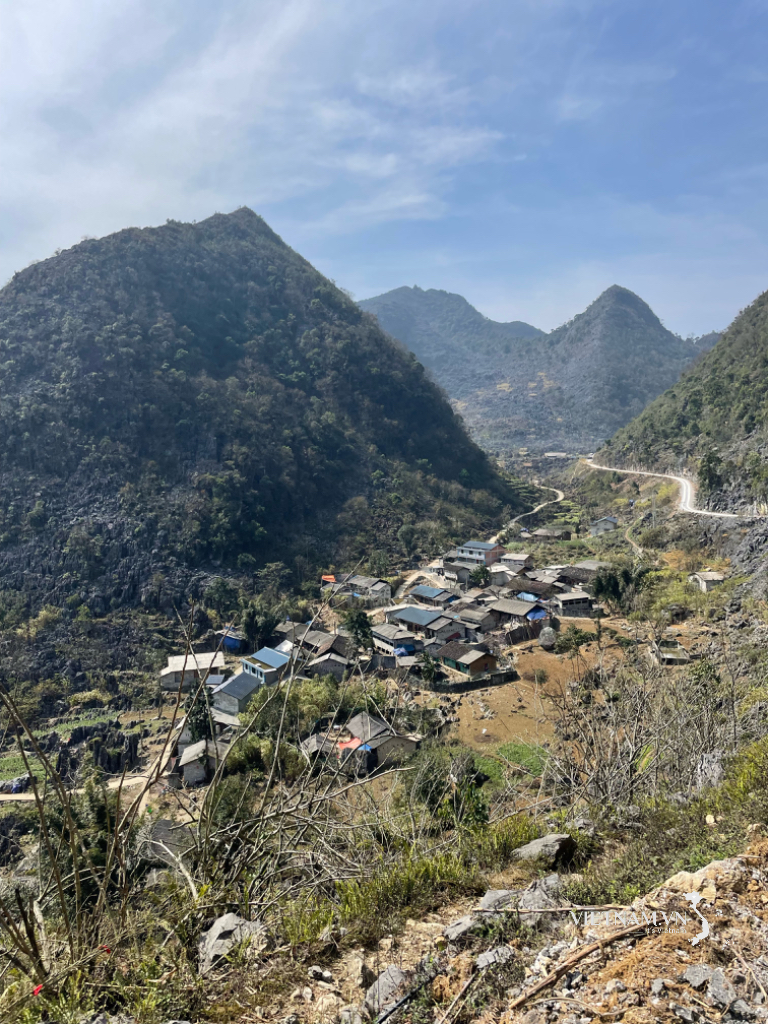Once upon a time, the countryside mainly used straw for roofing. These thatched roofs were replaced every few years when the straw turned a stale, ash-like color. In the countryside, when replacing a roof, people usually chose the time after the spring rice harvest, before the storm season. They carefully selected straw from good rice fields to use for thatching. After threshing, the stalks were tied together at the top and spread out like a conical hat to dry. When busy, they would simply spread them flat on the edge of the field or dike to dry before bundling them. Preparing the straw for thatching, women and children would shake and comb the straw to remove loose fibers. Men would split the stalks and prepare the rattan vines… When thatching, each handful of straw was carefully arranged to be even, and then tightly bound to the frame. The tiny straw stalks, when combined into a bundle, emitted a fragrant, sun-dried scent, carrying the sweat and joy of a successful rice harvest.
Straw was our daily fuel, and after the harvest, it was summer vacation for us children, so we often went scavenging for straw. With just a stick and a rope (or banana fiber), we'd find our way along the field paths and embankments, gathering the leftover straw. Each morning, we only needed to collect a bundle larger than our arms to have a good time. Back then, with our limited labor, we considered those bundles of straw a kind of achievement, a form of competition. Scavenging for straw was fun for us children because it gave us the chance to catch plump grasshoppers, beetles, or locusts hiding along the grass edges. We'd pool our straw to roast them; the rich, savory aroma would make all our fatigue disappear. Every morning in our familiar kitchen corner, the hot potatoes buried in the freshly red-hot straw ash seemed to be infused with the same fragrance, making them even sweeter and more aromatic.
The hot, humid summer sun is unpleasant, but farmers never fear it. The sun dries the rice and gives the straw its fragrant aroma. After each harvest, my grandmother would choose straw to make brooms. She made large brooms, small brooms, brooms for sweeping the house, the yard, the kitchen, the alley, and the road. The small house was always bustling with the rustling sound of straw and the sweet, warm scent of dry straw mingled with the sun. During the buffalo herding sessions, the children would bring laundry detergent, mix it with river water, and then go find straw to blow soap bubbles. The game of hide-and-seek around the straw piles should be called the "national game," because every rural child from the 1990s and earlier knew it. The feeling of excitement mixed with nervousness when covered in straw and lying or sitting still without moving was truly captivating. Sometimes, a child would fall asleep in the straw pile, causing the whole family to frantically search for them. When found out, they were scolded and beaten for being too preoccupied with playing and causing their parents worry.
With the invention and application of plows, transplanters, and combine harvesters, human and animal labor was liberated. However, the allure of urban industry gradually drew people away from the fields. For many years now, the fields have only been bustling with one harvest per year, and few households still raise buffalo or cattle. Thatched houses have long since disappeared, and clean gas fuel is now commonplace. During harvest season, the countryside still smells of golden straw, but few people still carefully dry and store it for animal feed and cooking. Passing by the fields during harvest now, one only smells the smoke from burning straw. While happy about the changes in life, the heart still longs for those sweet-smelling straw seasons. Those straw seasons witnessed so many ups and downs of a bygone era, of human lives…
Source


















































































![OCOP during Tet season: [Part 1] Ba Den custard apples in their 'golden season'](/_next/image?url=https%3A%2F%2Fvphoto.vietnam.vn%2Fthumb%2F402x226%2Fvietnam%2Fresource%2FIMAGE%2F2026%2F01%2F26%2F1769417540049_03-174213_554-154843.jpeg&w=3840&q=75)














Comment (0)